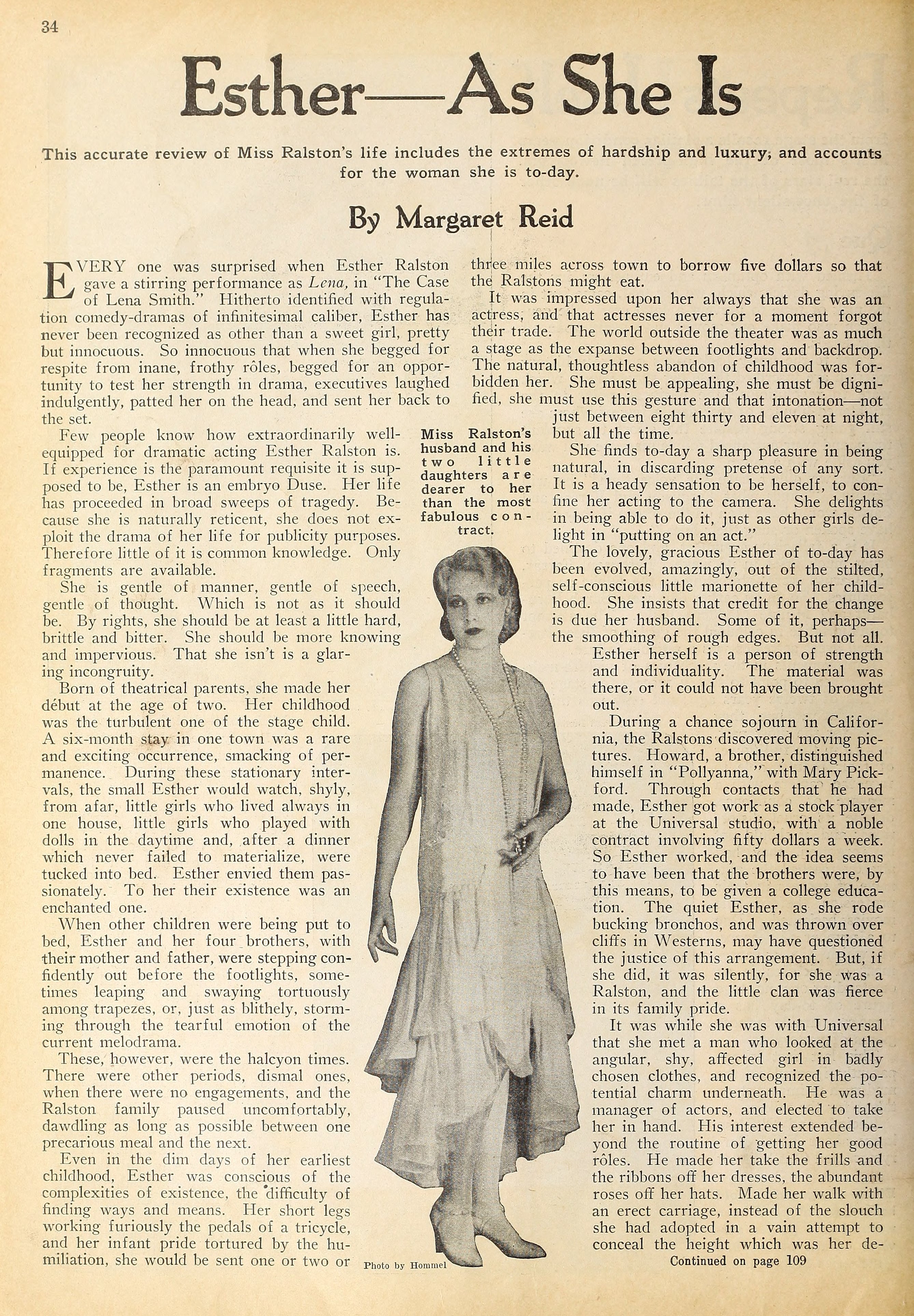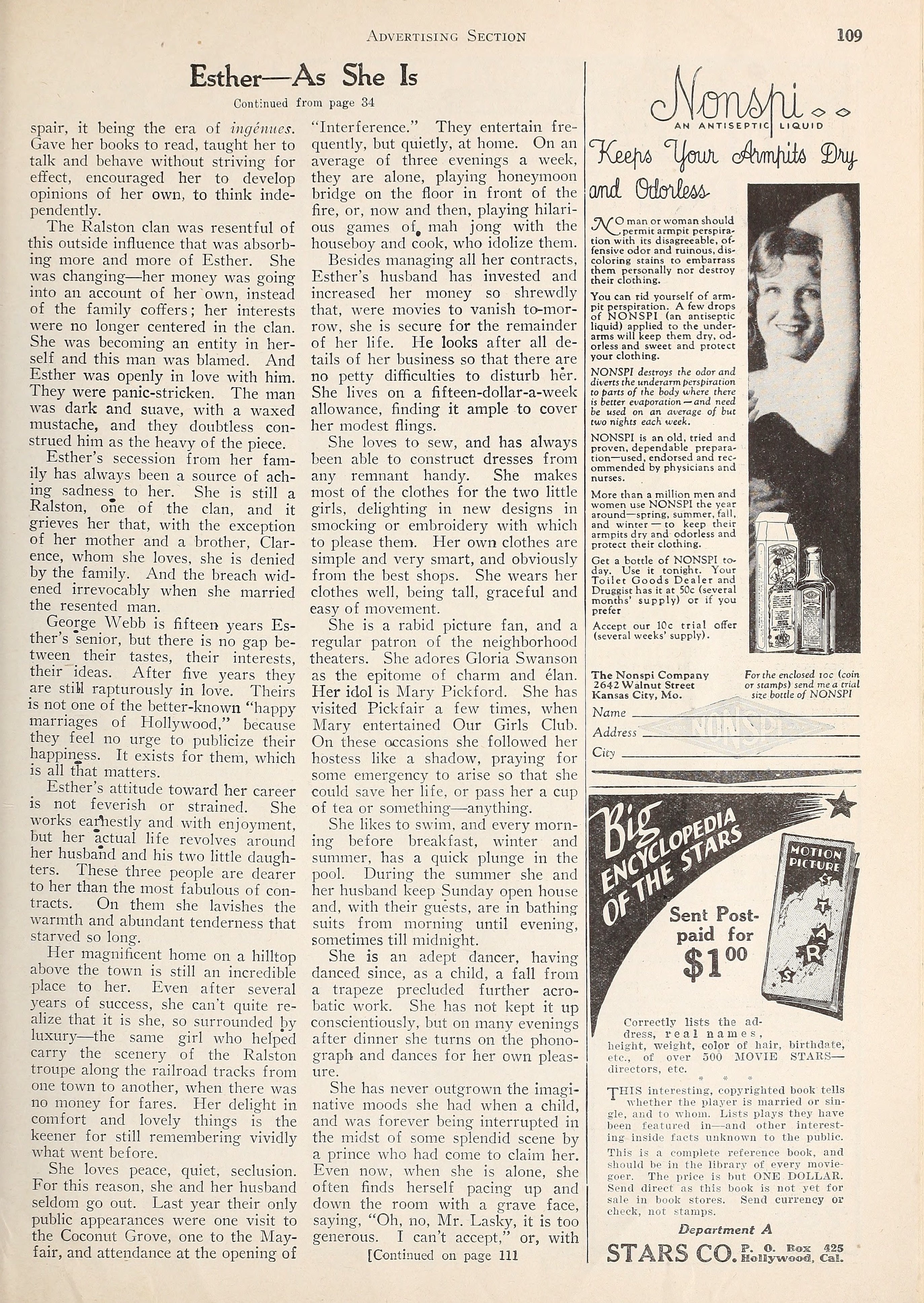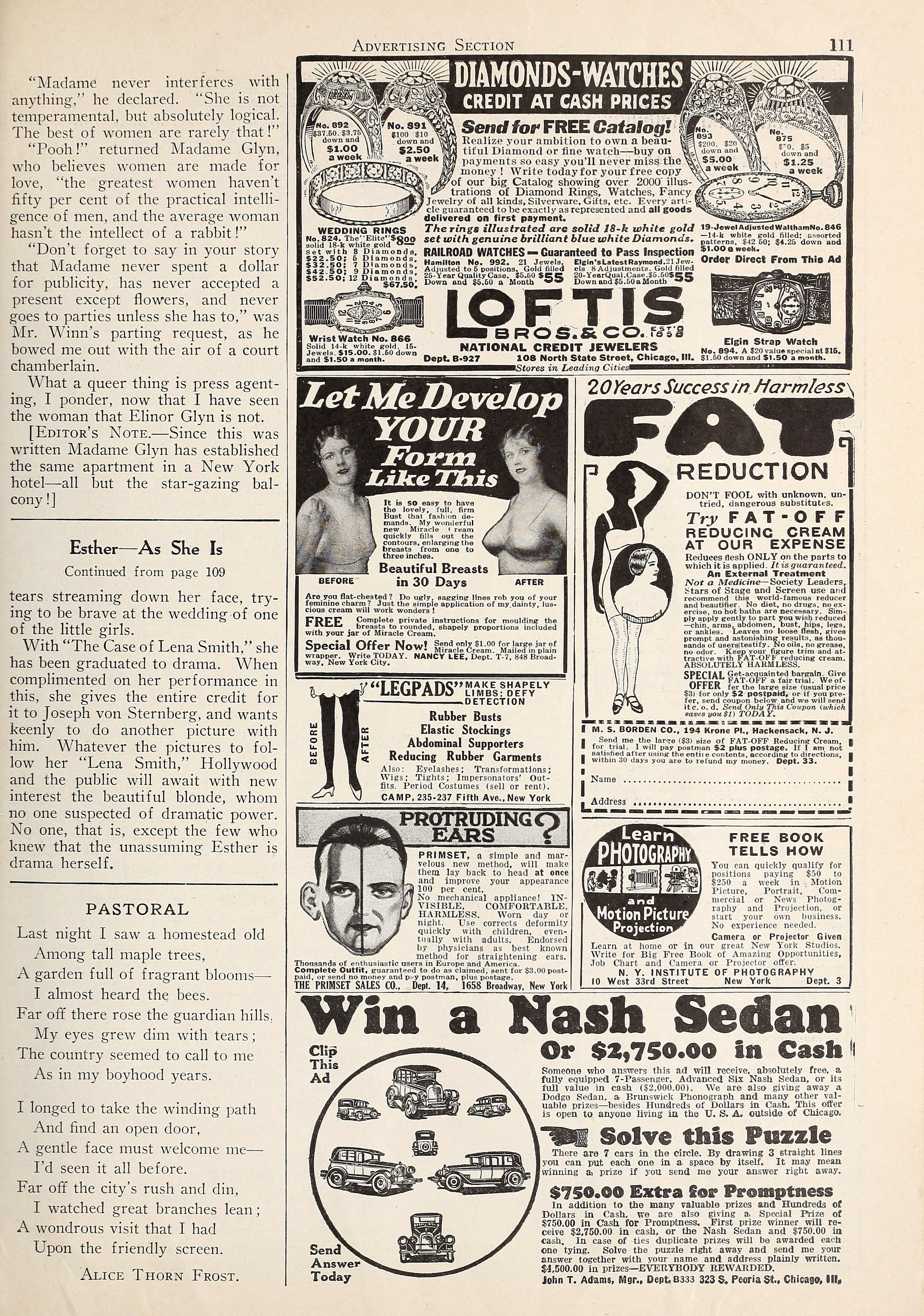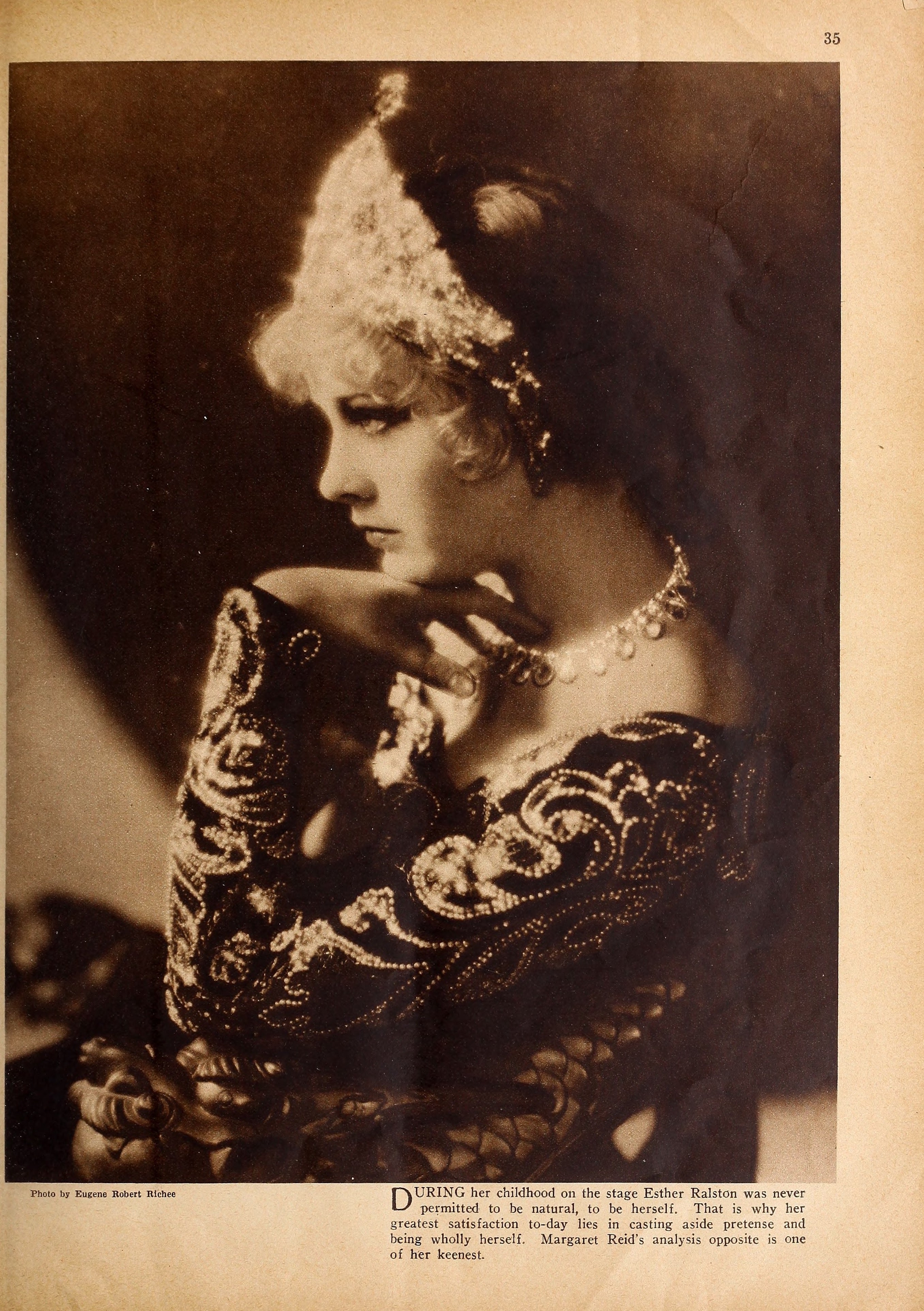Esther Ralston — As She Is (1929) 🇺🇸

Every one was surprised when Esther Ralston gave a stirring performance as Lena, in "The Case of Lena Smith." Hitherto identified with regulation comedy-dramas of infinitesimal caliber, Esther has never been recognized as other than a sweet girl, pretty but innocuous.
by Margaret Reid
So innocuous that when she begged for respite from inane, frothy roles, begged for an opportunity to test her strength in drama, executives laughed indulgently, patted her on the head, and sent her back to the set.
Few people know how extraordinarily well-equipped for dramatic acting Esther Ralston is. If experience is the paramount requisite it is supposed to be, Esther is an embryo Duse. Her life has proceeded in broad sweeps of tragedy. Because she is naturally reticent, she does not exploit the drama of her life for publicity purposes. Therefore little of it is common knowledge. Only fragments are available.
She is gentle of manner, gentle of speech, gentle of thought. Which is not as it should be. By rights, she should be at least a little hard, brittle and bitter. She should be more knowing and impervious. That she isn't is a glaring incongruity.
Born of theatrical parents, she made her debut at the age of two. Her childhood was the turbulent one of the stage child. A six-month stay in one town was a rare and exciting occurrence, smacking of permanence. During these stationary intervals, the small Esther would watch, shyly, from afar, little girls who lived always in one house, little girls who played with dolls in the daytime and, after a dinner which never failed to materialize, were tucked into bed. Esther envied them passionately. To her their existence was an enchanted one.
When other children were being put to bed, Esther and her four brothers, with their mother and father, were stepping confidently out before the footlights, sometimes leaping and swaying tortuously among trapezes, or, just as blithely, storming through the tearful emotion of the current melodrama.
These, however, were the halcyon times. There were other periods, dismal ones, when there were no engagements, and the Ralston family paused uncomfortably, dawdling as long as possible between one precarious meal and the next.
Even in the dim days of her earliest childhood, Esther was conscious of the complexities of existence, the 'difficulty of finding ways and means. Her short legs working furiously the pedals of a tricycle, and her infant pride tortured by the humiliation, she would be sent one or two or three miles across town to borrow five dollars so that the Ralstons might eat.
It was impressed upon her always that she was an actress, and that actresses never for a moment forgot their trade. The world outside the theater was as much a stage as the expanse between footlights and backdrop.
The natural, thoughtless abandon of childhood was forbidden her. She must be appealing, she must be dignified, she must use this gesture and that intonation — not just between eight thirty and eleven at night, but all the time.
She finds to-day a sharp pleasure in being natural, in discarding pretense of any sort. It is a heady sensation to be herself, to confine her acting to the camera. She delights in being able to do it, just as other girls delight in "putting on an act."
The lovely, gracious Esther of to-day has been evolved, amazingly, out of the stilted, self-conscious little marionette of her childhood. She insists that credit for the change is due her husband. Some of it, perhaps — the smoothing of rough edges. But not all. Esther herself is a person of strength and individuality. The material was there, or it could not have been brought out.
During a chance sojourn in California, the Ralstons discovered moving pictures. Howard, a brother, distinguished himself in Pollyanna, with Mary Pickford. Through contacts that he had made, Esther got work as a stock player at the Universal studio, with a noble contract involving fifty dollars a week. So Esther worked, and the idea seems to have been that the brothers were, by this means, to be given a college education. The quiet Esther, as she rode bucking bronchos, and was thrown over cliffs in Westerns, may have questioned the justice of this arrangement. But, if she did, it was silently, for she was a Ralston, and the little clan was fierce in its family pride.
It was while she was with Universal that she met a man who looked at the angular, shy, affected girl in badly chosen clothes, and recognized the potential charm underneath. He was a manager of actors, and elected to take her in hand. His interest extended beyond the routine of "getting her good roles. He made her take the frills and the ribbons off her dresses, the abundant roses off her hats. Made her walk with an erect carriage, instead of the slouch she had adopted in a vain attempt to conceal the height which was her despair, it being the era of ingenues. Gave her books to read, taught her to talk and behave without striving for effect, encouraged her to develop opinions of her own, to think independently.
The Ralston clan was resentful of this outside influence that was absorbing more and more of Esther. She was changing — her money was going into an account of her own, instead of the family coffers; her interests were no longer centered in the clan. She was becoming an entity in herself and this man was blamed. And Esther was openly in love with him. They were panic-stricken. The man was dark and suave, with a waxed mustache, and they doubtless construed him as the heavy of the piece.
Esther's secession from her family has always been a source of aching sadness to her. She is still a Ralston, one of the clan, and it grieves her that, with the exception of her mother and a brother, Clarence, whom she loves, she is denied by the family. And the breach widened irrevocably when she married the resented man.
George Webb is fifteen years Esther's senior, but there is no gap between their tastes, their interests, their ideas. After five years they are still rapturously in love. Theirs is not one of the better-known "happy marriages of Hollywood," because they feel no urge to publicize their happiness. It exists for them, which is all that matters.
Esther's attitude toward her career is not feverish or strained. She works earnestly and with enjoyment, but her actual life revolves around her husband and his two little daughters. These three people are dearer to her than the most fabulous of contracts. On them she lavishes the warmth and abundant tenderness that starved so long.
Her magnificent home on a hilltop above the town is still an incredible place to her. Even after several years of success, she can't quite realize that it is she, so surrounded by luxury — the same girl who helped carry the scenery of the Ralston troupe along the railroad tracks from one town to another, when there was no money for fares. Her delight in comfort and lovely things is the keener for still remembering vividly what went before.
She loves peace, quiet, seclusion. For this reason, she and her husband seldom go out. Last year their only public appearances were one visit to the Coconut Grove, one to the Mayfair, and attendance at the opening of Interference. They entertain frequently, but quietly, at home. On an average of three evenings a week, they are alone, playing honeymoon bridge on the floor in front of the fire, or, now and then, playing hilarious games of mah jong with the houseboy and cook, who idolize them.
Besides managing all her contracts, Esther's husband has invested and increased her money so shrewdly that, were movies to vanish to-morrow, she is secure for the remainder of her life. He looks after all details of her business so that there are no petty difficulties to disturb her. She lives on a fifteen-dollar-a-week allowance, finding it ample to cover her modest flings.
She loves to sew, and has always been able to construct dresses from any remnant handy. She makes most of the clothes for the two little girls, delighting in new designs in smocking or embroidery with which to please them. Her own clothes are simple and very smart, and obviously from the best shops. She wears her clothes well, being tall, graceful and easy of movement.
She is a rabid picture fan, and a regular patron of the neighborhood theaters. She adores Gloria Swanson as the epitome of charm and élan. Her idol is Mary Pickford. She has visited Pickfair a few times, when Mary entertained Our Girls Club. On these occasions she followed her hostess like a shadow, praying for some emergency to arise so that she could save her life, or pass her a cup of tea or something — anything.
She likes to swim, and every morning before breakfast, winter and summer, has a quick plunge in the pool. During the summer she and her husband keep Sunday open house and, with their guests, are in bathing suits from morning until evening, sometimes till midnight.
She is an adept dancer, having danced since, as a child, a fall from a trapeze precluded further acrobatic work. She has not kept it up conscientiously, but on many evenings after dinner she turns on the phonograph and dances for her own pleasure.
She has never outgrown the imaginative moods she had when a child, and was forever being interrupted in the midst of some splendid scene by a prince who had come to claim her. Even now, when she is alone, she often finds herself pacing up and down the room with a grave face, saying, "Oh, no, Mr. Lasky, it is too generous. I can't accept," or, with tears streaming down her face, trying to be brave at the wedding of one of the little girls.
With The Case of Lena Smith, she has been graduated to drama. When complimented on her performance in this, she gives the entire credit for it to Joseph von Sternberg, and wants keenly to do another picture with him. Whatever the pictures to follow her Lena Smith, Hollywood and the public will await with new interest the beautiful blonde, whom no one suspected of dramatic power. No one, that is, except the few who knew that the unassuming Esther is drama herself.

Miss Ralston's husband and his two little daughters are dearer to her than the most fabulous contract.
Photo by: George Peter Hommel (1901–1953)



During her childhood on the stage Esther Ralston was never permitted to be natural, to be herself. That is why her greatest satisfaction to-day lies in casting aside pretense and being wholly herself. Margaret Reid's analysis opposite is one of her keenest.
Photo by: Eugene Robert Richee (1896–1972)
Collection: Picture Play Magazine, July 1929
